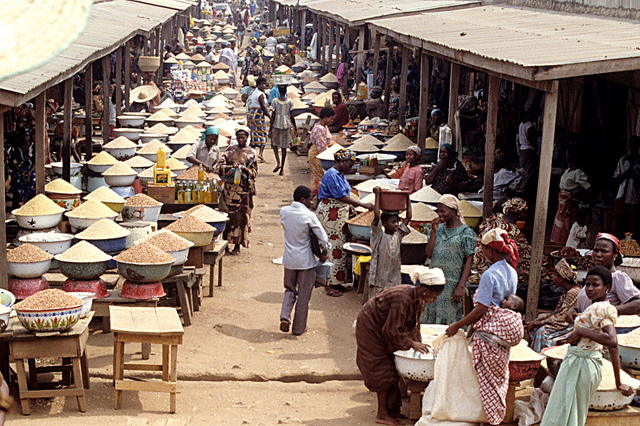Nigeria claims 3.46% GDP growth amid hunger protests across the country
By Jeph Ajobaju, Chief Copy Editor
Gross Domestic Product (GDP) grew 3.46 per cent in the fourth quarter of 2023 (Q4 2023) without a positive impact on the living conditions of Nigerians, as usual, and that has again raised concern in the face of hunger protests across the country.
The latest National Bureau of Statistics (NBS) data shows GDP rose 3.46 per cent year-on-year (YoY) in real terms in Q4 2023, lower than 3.52 per cent in Q4 2022, and higher than 2.54 per cent in Q3 2023.
The monetary value of all finished goods and services made in Nigeria was N21.77 trillion in Q4 2023.
But this has yet to translate into improved wellbeing for citizens who are confronted with economic hardship caused by soaring inflation and a high cost of living as seen on the streets North and South.
NBS disclosed in January inflation rose to a record high of 29.90 per cent, worsened by 35.42 per cent food inflation.
Below is the take of economics and other professionals on the enigma, as compiled by Daily Post.
Okechukwu Unegbu (former Chartered Institute of Bankers of Nigeria (CIBN) President)
“Nigeria’s GDP growth in Q4 does not reflect on the streets of Lagos or anywhere in the country, indicating a disconnect between the figure and reality.
“3.46 per cent GDP growth should ordinarily reflect on the nation’s economy. Other developing countries with 3 per GDP growth are doing very well, but the reverse is the case in Nigeria.
“Rising unemployment, inflation, foreign crisis and other factors are negative factors against economic growth and GDP will remain low without adequate return to mass production.”
Godwin Oyedokun (Professor at Lead City University, Ibadan)
“Rising inequality, corruption, poor governance, dependence on oil and a lack of infrastructure are the reasons why Nigeria’s GDP growth rate does not translate to economic prosperity for its citizens.
“The country must address the underlying issues hindering in-country production for GDP growth to impact citizens.
“Overall, a combination of factors such as inequality, corruption, poor governance, dependence on oil, and a lack of infrastructure have all contributed to Nigeria’s GDP growth not translating into economic prosperity for its citizens.
“Addressing these underlying issues will be crucial for Nigeria to achieve inclusive and sustainable economic development.”
Idakolo Gbolade (SD & D Capital Management Chief Executive Officer)
“The government must implement policy on loans to the manufacturing sector and small and medium-sized enterprises [SMEs] to stimulate the economy and engender growth.
“The GDP figures in Q4 2023 are a result of improved economic activities in the oil and gas sector which have increased our oil output and exploration.
“In Q4 2023, oil and gas contributed meaningfully to GDP, and this improvement led to the growth witnessed in Q4 2023 GDP.
“Economic growth as signified by GDP growth can only translate to real growth when government policies are implemented aggressively in agriculture, oil and gas (exploration and refining), manufacturing sector and SMEs.
“As a matter of urgency, the government needs to implement a policy on loans to the manufacturing sector and the SMEs to stimulate the economy and engender growth.
“The pace of agricultural revolution is also unacceptable, and urgent steps need to be taken on the implementation side.
“When there is increased economic activities and internal food security, Nigerians can begin to feel the real impact of the growth in economic activities.”
__________________________________________________________________
Related articles:
Hilda Dokubo highlights how government abuses Nigerians
Tinubu’s Lagos up in another protest over hunger
Tinubu rents crowd to rally for him in Abuja, despite growing hunger
__________________________________________________________________


